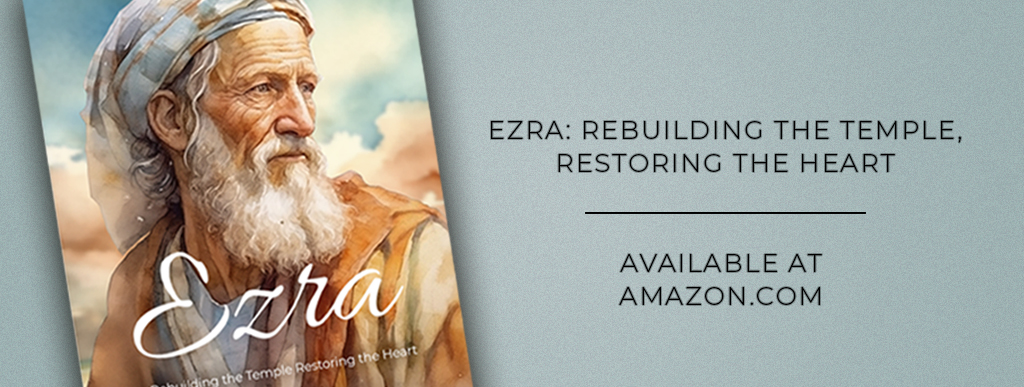Ezra Bible Study Week 3 Part 2
Are you looking for the other posts in this study? Click here for the table of contents.

Concluding Thoughts on Chapter 3 – The Best of My Time and All of My Heart
Do you ever have one of those moments in life when everything seems to be going your way? When everything’s going according to plan? When suddenly, expectations collide with reality and you’re standing there mourning a loss.
Sometimes expectations have a way of blocking reality and distorting our view on what’s really important in life. We’re so used to having things one way, that we tend to close ourselves off from the blessings at hand.
As I got to reading this chapter this week, and as I read verse 12 where “many of the older priests and Levites and family heads, who had seen the former temple, wept aloud when they saw the foundation of this temple being laid,” I was reminded how the Bible tells us,
Many are the plans in the mind of a man, but it is the purpose of the LORD that will stand. (Proverbs 19:21, ESV)
So it was with the building of the temple. It really didn’t matter whether expectations were met or they weren’t, in any case God’s plan would prevail.
It’s easy to trust God when He does things our way, but to faithfully trust Him takes faith–faith in His plan, and faith in His wisdom and power.
This temple was smaller. This temple wasn’t quite as spectacular as the first temple had been, but the good news in all this? God’s plan excels ours in every possible way. We don’t need to know all of the how’s and the why’s. What we really need is to trust in His power and to lean on His strength.
Answer Key – Chapter 3
- What did Haggai prophesy in Haggai 2:9? And why do you think he made that claim?
‘The glory of this present house will be greater than the glory of the former house,’ says the LORD Almighty. ‘And in this place, I will grant peace,’ declares the LORD Almighty.
Because Jesus Himself would enter the temple.
2. According to Leviticus 23, what took place on the 15th day of the 7th month?
They celebrated the Feast of Tabernacles for 7 days.
3. What are two other names for the Feast of Tabernacles?
Booths, Ingathering
4. What did they do during that week-long celebration, and why?
They were to dwell in booths for seven days in remembrance of the children of Israel who dwelled in booths for 40 years in the wilderness, when God brought them out of the land of Egypt.
5. Who were the two men that began the building of the altar?
Joshua and Zerubbabel
6. Verse 2 says that they built the altar as it was written in the law of Moses. How large was the altar that Moses built (in feet)? See Exodus 27:1.
Seven and a half feet square and four and a half feet high.
7. When did they start building the temple?
In the second month of the second year.
8. They used cedar logs to build the temple. How did they get them?
They came by sea from Lebanon to Joppa, as authorized by Cyrus king of Persia.
9. What encouragement would you give someone who wants to make God a priority in their life?
(This answer will be different for everyone)
10. What kind of things distract you from making God your first priority?
(This answer will be different for everyone)
Concluding Thoughts on Chapter 4 – Clothed with the Righteousness of Christ
Reading over the chapter this week, I couldn’t help but stop at verse 4.
Then the peoples around them set out to discourage the people of Judah and make them afraid to go on building. (Ezra 4:4, NIV)
Notice the word “discourage” there. To encourage someone is to instill courage in them (which we’ll talk about in the next chapter), whereas to discourage someone is to take their courage away.
Discouragement can be debilitating at times, as we see in chapter 4. All it takes is one person to plant a seed of doubt, and before you know it that doubt can take you down.
Satan will always try to magnify our flaws and make us insecure, in hopes that by doing so we lose our courage and turn our eyes away from God. Many step back in fear before stepping forward in faith.
We all know the story of David and Goliath, but do you remember what transpired just before he went down? Goliath mocked David saying, “Am I a dog, that thou come at me with sticks?”
In other words, he was trying to discourage David by pointing out his weakness and the folly of his ways. But here’s the interesting thing about David that set him apart from the other men–he wasn’t focused on the slingshot, he was focused on the Lord.
“Thou comest to me with a sword, and with a spear, and with a shield,” he said, “but I come to thee in the name of the Lord of hosts, the God of the armies of Israel, whom thou hast defied.”
You see, Satan will always try to discourage us by pointing out our flaws. He’ll focus on our weakness in hopes that we’ll do the same.
The way to combat that kind of discouragement? Don’t focus on the slingshot, stay focused on the Lord.
Answer Key – Chapter 4
- This chapter starts out by telling us that Judah’s adversaries approached them and offered to help. As we see in verse ten, these people were Samaritans. Throughout scripture, the Samaritans and the Jews were at odds with each other. Who was the founder of Samaria? And how did that come about? See 1 Kings 16:21-28.
After the Israelites split into two groups, Omri, king of Israel, bought the hill of Samaria from Shemer for two talents (about 150 pounds) of silver. He built a city on the hill, calling it Samaria, after Shemer, the name of the former owner of the hill. - What does 2 Kings 17:24 tell us about this group of people from Samaria? How did they arrive there?
The king of Assyria brought them from Babylon, and from Cuthah, and from Ava, and from Hamath, and from Sepharvaim, and placed them in the cities of Samaria instead of the children of Israel: and they possessed Samaria, and dwelt in the cities thereof. - Did they really seek God the way that the Israelites did? Or was that a lie? What does 2 Kings 17:33 tell us?
They feared God but continued serving their false gods as well. - How did the enemy get the officials to work against the people of Judah?
They bribed them. - What are two of the accusations made against the people of Judah found in verse 15?
They were a rebellious city
They were troublesome to kings - What happened after the king’s letter was read to Rehum and Shimshai?
They were forced to stop their work. - Have you ever felt guilty for something you have done in the past even though you know that God has forgiven you for it?
(This answer will be different for everyone.) - What Bible verses (find 2) could you share with someone who is struggling to let go of guilt and accept God’s forgiveness?
(This answer will be different for everyone.)
When you purchase a copy of the study guide, you’re actively supporting and strengthening our ministry as we spread the empowering message of the gospel to women across the globe!

We understand that not everyone can purchase the study guide, which is why we provide a printable version exclusively for those facing financial constraints. By subscribing below, you’ll unlock access to these downloadable materials. As part of our community, you’ll have the opportunity to explore the content at your own pace. Plus, as an added treat, you’ll receive periodic devotions from Time-Warp Wife, delivered directly to your inbox. Together, we can grow in faith and discover the abundant blessings of our shared journey. Join us in spreading the empowering message of the gospel to women all around the world.
FREE Printables – Autumn Scripture Cards
During the 6 weeks of the Bible study, I’ll be creating a set of Autumn-themed 4 x 4 inch scripture cards. Each week I’ll give you 4 for a total of 24 cards in total. These high resolution images will correspond with the theme of each week.
Click here to view and print this week’s note cards.

